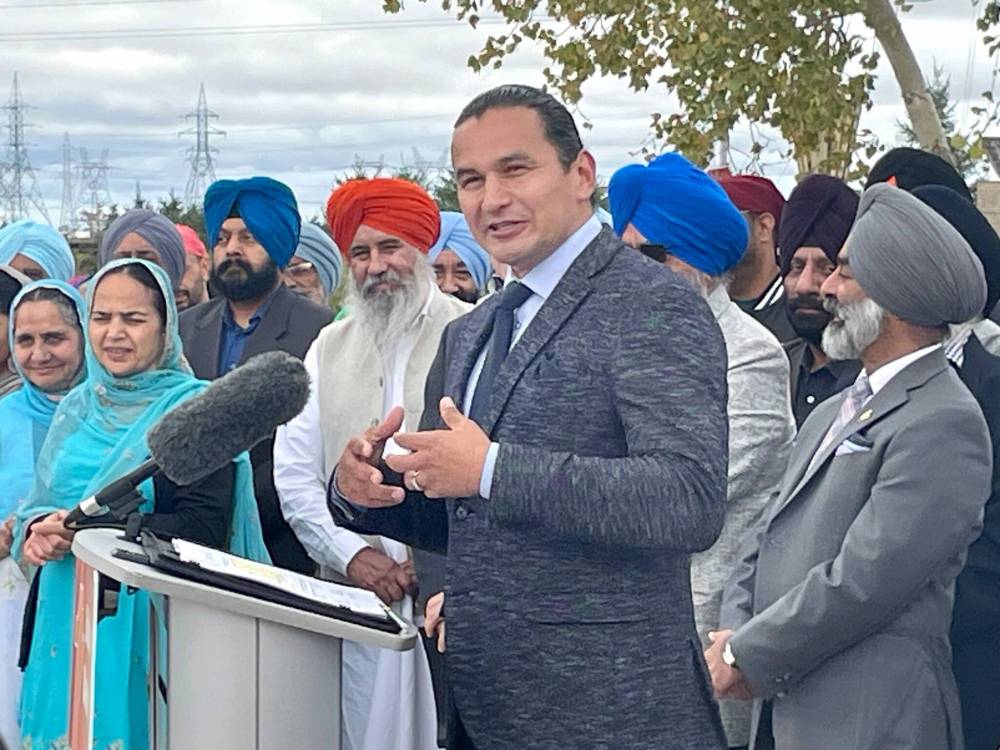Manitoba details argument against Quebec’s secular law
Advertisement
Read this article for free:
or
Already have an account? Log in here »
To continue reading, please subscribe:
Monthly Digital Subscription
$1 per week for 24 weeks*
- Enjoy unlimited reading on winnipegfreepress.com
- Read the E-Edition, our digital replica newspaper
- Access News Break, our award-winning app
- Play interactive puzzles
*Billed as $4.00 plus GST every four weeks. After 24 weeks, price increases to the regular rate of $19.00 plus GST every four weeks. Offer available to new and qualified returning subscribers only. Cancel any time.
Monthly Digital Subscription
$4.75/week*
- Enjoy unlimited reading on winnipegfreepress.com
- Read the E-Edition, our digital replica newspaper
- Access News Break, our award-winning app
- Play interactive puzzles
*Billed as $19 plus GST every four weeks. Cancel any time.
To continue reading, please subscribe:
Add Winnipeg Free Press access to your Brandon Sun subscription for only
$1 for the first 4 weeks*
*$1 will be added to your next bill. After your 4 weeks access is complete your rate will increase by $0.00 a X percent off the regular rate.
Read unlimited articles for free today:
or
Already have an account? Log in here »
Manitoba has submitted its legal arguments against the Quebec law that bans public servants from wearing religious symbols on the job as the case is set to be heard by the Supreme Court of Canada.
“Manitoba has intervened in that case at the Supreme Court to protect our province’s interests,” Premier Wab Kinew said at an unrelated news conference at a Sikh temple on Thursday.
The law “would prevent a Sikh person from wearing a turban, that would prevent a Christian from wearing a cross or a crucifix… a Muslim wearing a hijab, a Hutterite person wearing a head covering, and on and on down the list.” Kinew said.

Ruth Bonneville / Free Press
Premier Wab Kinew: “Manitoba has intervened in that case at the Supreme Court to protect our province’s interests.”
Manitoba is one of five provinces among close to nearly three dozen interveners in the legal challenge of the law, called Bill 21, brought by several groups that oppose it. A date for a hearing before the high court has not been set.
When Quebec passed its legislation in 2019, it invoked the notwithstanding clause of the Charter that can be used by provinces to shield laws from constitutional challenges.
Kinew said although the notwithstanding clause was used, courts across Canada should still be able to review a law such as Quebec’s secular legislation.
“A court should still be allowed to decide whether a government should be able to ban a Sikh person from wearing a turban or whether a government should be allowed to ban a Christian wearing a cross or a crucifix,” Kinew said.
“While that court might not be able to strike down the law, the court should still make the ruling so that the people at the next election can decide what they think of the government that did that,” he said.
Manitoba’s 39-page argument, filed by lawyers for the attorney general, says the Charter of Rights and Freedoms “should be interpreted in a manner that best promotes the role and responsibility of all branches of government to secure the rights and freedoms of persons in Canada.”
The federal government is also an intervener. It wants the court to set limits on how the notwithstanding clause can be invoked.
It contends the repeated use of the clause amounts to “indirectly amending the Constitution,” and that courts should be able to rule on whether it may result in the “irreparable impairment” of Canadians’ rights.
— with files from Joyanne Pursaga and The Canadian Press
carol.sanders@freepress.mb.ca

Our newsroom depends on a growing audience of readers to power our journalism. If you are not a paid reader, please consider becoming a subscriber.
Our newsroom depends on its audience of readers to power our journalism. Thank you for your support.




